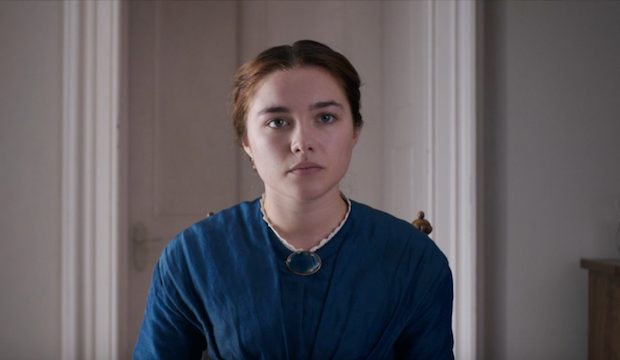In selected cinemas nationwide now.
Another in a line of stunningly assured British debut features appearing in cinemas, William Oldroyd’s Lady Macbeth is a period drama that shakes off the rigid corset of gentility, and embraces lusty sex, passionate violence and an exhilarating amorality. Based on Nikolai Leskov’s lurid 1865 novel, Lady Macbeth of the Mtensk District, it is stuffed with echoes of classic texts and the pitch-dark noir of classic Hollywood. In its title character it’s as if Flaubert’s Emma Bovary is portrayed by Barbara Stanwyck; a femme fatale of no little charm and a calculating psychosis.
Catherine (Florence Pugh) is a young woman, marooned in a loveless marriage to an older man (Paul Hilton). They live with his stern, joyless father (Christopher Fairbank) in an isolated country estate in the north east of England. She is forbidden from leaving the house, humiliated by her husband and lambasted by her father-in-law for not performing her conjugal duties. When both men are away on separate business matters, she takes the opportunity to roam the estate and meets Sebastian (Cosmo Jarvis), a sullen, yet roughly charismatic farmhand to whom she is instantly attracted. In the fury of their lust, murder isn’t far away.
Screenwriter Alice Birch has done an incredible job adapting the source novel. Relatively sparse in dialogue, the characters communicate just as much through their body language and reactions. From Catherine’s withering disdain for the impotent boor she’s married to the cowed dismay of Anna the servant (a subtle, heartbreaking Naomi Akie), the dictum of less is more is followed admirably. There is also a sudden, devious about turn in our sympathies toward Catherine. Even as we know the path she is taking is a dark one, we’re with her, even as we’re being as manipulated as poor, coarse Sebastian. One horrendous deed in the final act however, and the sense of repulsion is intense. This is down to the excellent writing, unafraid of letting jagged obsidian slivers of black comedy shred the oppressive atmosphere; and the fearless, commanding performance of Florence Pugh, more than fulfilling the promise she showed in The Falling.
The other most interesting aspect of the film is the constant ebb and flow of the power dynamics throughout. Class and race are huge themes that lurk like the elephants in the room; not directly addressed, yet ever-present. Catherine’s forced subservience to the men trickles down to her haughty treatment of the servants. That Anna is black and Sebastian is mixed race is never mentioned, yet Anna’s muteness speaks volumes about voices silenced for hundreds of years.
Lady Macbeth is a striking, daring film about lust, power and the constraints upon it. It is a convergence of several major new talents in film announcing themselves all at once. It’s hugely confident, and possessed of an admirable mean streak that will likely limit its appeal to the very audience it would normally attract. Easily one of the films of the year so far.
